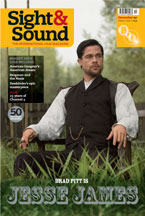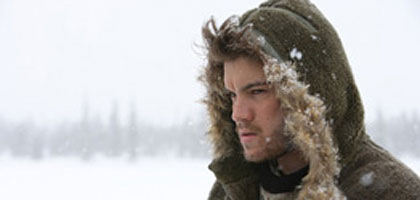Primary navigation


A recreation of the real-life journey of 22-year-old drop-out Chris McCandless from the comfort of Virginia to the solitude of Alaska proves the perfect vehicle for Sean Penn's directorial talents. Tim Robey follows the trail
Parenthood and grief have marked Sean Penn's work as both actor and director. Tot up the dead children in The Crossing Guard (1995), The Pledge (2000), Mystic River (2003) and 21 Grams (2003) and you have enough for a small kindergarten in the sky. Heavy-duty, overwrought melodramas all, these films square up to bereavement with virtuoso acting displays and chest-puffing macho reprisals rather than with gravity or insight.
Into the Wild turns these Penn preoccupations on their head, in that it's more about the condition of being lost than about losing: an epic of wanderlust, loneliness and serial farewells, most of them final. In adapting Jon Krakauer's 1996 non-fiction account of Chris McCandless, a cosseted 22-year-old Virginian who abandoned his family in the summer of 1990 to live life on the open road, Penn the director - gifted but overreaching, bold to the point of indulgence, prone to an almost rabid self-seriousness - has landed on a narrative that fits his virtues and flatters his flaws. If it weren't too catty, you could say that what makes him the right director for the material is that it takes a narcissist to know one.
This upper-crust kid must have had a huge fund of self-love to make his solo quest endurable, not just Byron's "pleasure in the pathless woods". Soon after graduation he burned his social-security card, donated his savings to Oxfam and hit the road. Accompanied by well-thumbed copies of Thoreau and Jack London, he spent two years hitching rides on trucks, trailers and railroads, stopping often though never for long, on a Littlest Hobo-like trek towards the solitude of Alaska. He made it in April 1992.
Penn and his cinematographer Eric Gautier have no trouble communicating McCandless' addiction to wide-open landscapes from the shores of the Salton Sea to the slopes of Mt McKinley, but their canniest move is to turn their gaze on the youngster himself with an equal degree of aesthetic reverence. The camera has always loved the handsome, slightly feral Emile Hirsch, but this is the first movie in which it has a full-blown, clothes-off relationship with him, repeatedly caressing him in slo-mo. The fourth wall is broken in one sequence when Hirsch's Chris is goofing around with an apple and for a moment it's as if we were watching his private video journal - a vanity project to set alongside his written recollections and carved mementoes. Hirsch renders the character as touchingly mistaken in his ideals, more oblivious than hubristic, but in Chris' choice of 'Alexander Supertramp' as a pet name for himself there's an unmistakable whiff of Nietzschean solipsism.
Penn as screenwriter has followed the chronology of McCandless' journey assiduously, though he fleshes out many of the episodes and acquaintanceships in the book and gives the voiceover to Chris' sister Carine, a much less important presence in Krakauer's account. This is one of his best decisions. Jena Malone, more heard than seen, does an exquisite job in relating the breakdown of trust in the McCandless family in the years before Chris' disappearance. The revelation that their father Walt (William Hurt) was a bigamist with a son from another marriage and that their mother Billie (Marcia Gay Harden) had been complicit in this deceit was felt by Chris as "a murder of every day's truth", sending his relationship with both into a spiral of irremediable decline. But while Carine sympathises with her brother's desire to leave the roost, the pain of his absence takes its toll on her, and her voice drifts through the movie with a measured sorrow and haunted, beseeching tone.
"Children can be pretty harsh when it comes to their parents," we hear from Rainey (Brian Dierker), half of a traveller couple to whom Chris becomes a surrogate son during his nomadic escapades. Chris' feelings about his mother and father are only ever speculated on by others; when the topic rears its head, he clams up. Though he has words of advice for his companions in almost any situation, these tend to be filched from his favourite novelists, and it's possible to read a degree of emotional autism into his inability to describe, let alone forgive, the problems and frustrations of his adolescence. The journal entries we see are sparse and functional; for all his claims to bookishness, Chris is a hero lost for words, perhaps looking for a habitat where he has no further use for them. He also renounces sex, gently fending off the advances of a 16-year-old trailer-park songstress (Kristen Stewart), a dead ringer for his sister, who falls quickly and painfully in love with him. The sadness of the film's goodbyes is acute because Chris isn't coming back and everyone he meets knows it.
One of the weaknesses of The Pledge was Penn's tendency to give too much slack to his veteran cast, with single-scene cameos for Vanessa Redgrave, Helen Mirren and Mickey Rourke repeatedly stalling the momentum. But here the episodic quality of the narrative suits Penn's actor-friendly style. Vince Vaughn has a funny section as a gregarious South Dakota harvester and Danish actors Thure Lindhardt and Signe Egholm Olsen pop up as an oddball backpacker couple camping by the Colorado River. Marcia Gay Harden is on familiar turf as a faintly clueless mom, but for sheer concentration and craft there's no beating William Hurt, whose single-take collapse on to a suburban street, weighed down by incomprehension at his son's disappearance, is as magnificent a few seconds of acting as he's ever given us.
If Penn could be faulted, it's for overshaping: after kicking off with an attempt at loose and poetically non-linear narrative patterning he loses his nerve and starts cluttering the film with chapter headings. Chris' symbolic growth from 'Birth' through 'Adolescence' to 'The Getting of Wisdom' is only tenuously backed up by the experiences we witness, though it's certainly true that an epiphany of sorts is reached after a series of setbacks in the Alaskan bush. Scrawled marginalia in one of his books reads "Happiness only real when shared", an outright rejection of the philosophy of self-sufficiency that got him there. As the final friend he makes before severing human contact altogether, Hal Holbrook makes a welcome return to the screen, but the conversations Penn has written for them about forgiveness and love seem to be trying to win the movie an ending and strike a false, platitudinous note. A final irony is also missed: that Chris McCandless lived out his Alaskan ordeal just 16 miles from a National Park tourist hub.
On the whole, though, even Penn's more indulgent flourishes seem to enhance the film's keen feeling. With its swooping hunger for landscape and new experience, it plunges headlong into the giddy, passionate convictions of its hero, then pulls back to show us what he's missing - and how badly he is missed.